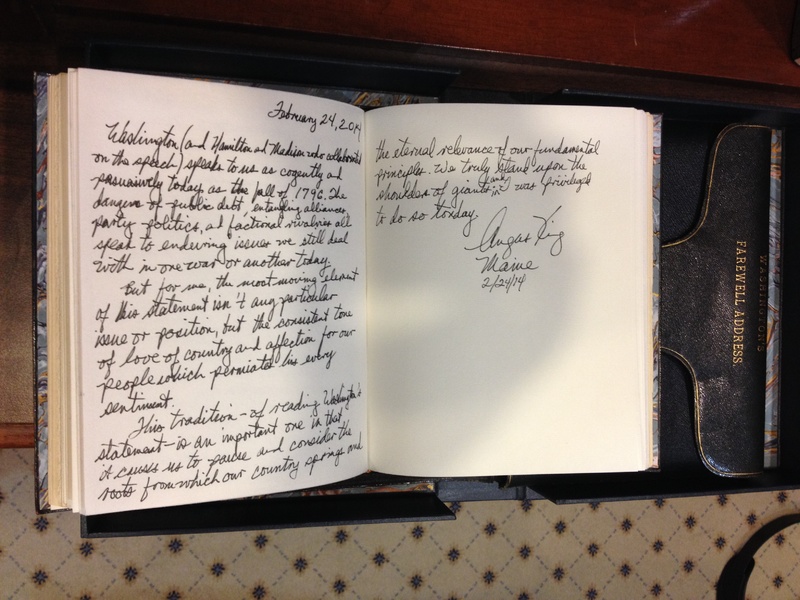WASHINGTON — Every February for the past 118 years, the U.S. Senate has observed a unique tradition. One senator is chosen to recite the “Farewell Address” that George Washington delivered in 1796 to a country he led to independence and then into proper nationhood as its first elected leader.
Senators selected to read Washington’s words – all 7,641 of them, typically taking about 45 minutes – then sign a leather-bound book and add a few personal lines. For nearly 50 years, the senators’ inscriptions barely strayed from a formal script of “Read in accordance with …” or “Read according to custom …”
Beginning in 1944 in the midst of World War II, those inscriptions start to become more reflective as senators talk about the honor of rereading Washington’s words of caution and encouragement for the young nation.
But it was Sen. Margaret Chase Smith of Maine – the first woman ever to read the farewell address on the Senate floor – who, in 1949, was the first senator to delve even deeper and attempt some modern introspection on what were then 153-year-old lines.
Picking up on Washington’s isolationist views and stern warnings to avoid foreign “entanglements,” Smith wrote: “As I read this, I wondered what our first president would think if he were alive today. Would he condemn the proposed North Atlantic Pact as an entangling alliance?” Smith wrote, referring to the agreement creating the North Atlantic Treaty Organization, or NATO, just five weeks later.
“The objective is the same today – freedom. The only difference is the way to obtain that freedom,” Smith concluded.
Smith’s entry began a new tradition of senators using the “Farewell Address” journal to apply Washington’s words to the major events or political themes of their own days. Images of most of those entries are available on the Senate website dedicated to the “Farewell Address” tradition.
“In these days, when the troubles of the mind and the conscience are multiplying, as we tend to turn more to the material and less to the spiritual for the solution to them, it is correct that Americans pause to remember their basic sources of strength,” Sen. Barry Goldwater of Arizona wrote in 1957. “These sources are carefully outlined in the documents left us by these wise men who, thru God, created our republic.”
In 1959, Colorado Sen. Gordon Allott wrote that Washington had “painted the picture of excessive party interest and its effects in a way that history has shown true and continues to prove.”
Seven years later, as the nation was torn by the civil rights struggle and Vietnam, Montana Sen. Lee Metcalf wrote how “a golden thread running through the fabric of the entire address is the call for national unity.”
“Not North against South or East against West but a union of free people,” Metcalf wrote. “Washington who did so much to preserve the union admonished against any destruction of it. In times of strife over Civil Rights … this wise advice is to be heeded.”
The shadow of the Sept. 11, 2001, terrorist attacks and the growing war in Afghanistan obviously still hung over the nation when, five months later, New Jersey Sen. Jon Corzine penned his entry.
“At this time when our nation and her people have suffered, we must remember that our freedoms are not free,” Corzine wrote. “Like Washington and his fellow citizens, we must work for these freedoms, and sadly, some will die defending them.”
This year, Sen. Angus King became the third Maine senator – after Smith and Sen. Edmund S. Muskie in 1964 – to deliver Washington’s speech and sign the journal. (Unlike in the early years of the tradition, however, when all senators gathered to hear Washington’s speech, King spoke to a largely empty chamber – as is the case today for most Senate and House floor speeches.)
“Washington (and Hamilton and Madison who collaborated on the speech) speaks to us as cogently and persuasively today as the fall of 1796,” King wrote in his own lengthy entry. “The dangers of public debt, entangling alliances, party politics and factional rivalries all speak to enduring issues we still deal with in one way or another today.”
But King wrote that he was most moved by Washington’s “consistent tone of love of country and affection for our people,” adding that “we truly stand upon the shoulders of giants and I was privileged to do so today.”
MICHAUD, PINGREE JOIN PETITION
Both of Maine’s U.S. House members – Democrats Chellie Pingree and Mike Michaud – joined the effort to force House Republicans to hold a vote on increasing the federal minimum wage from $7.25 to $10.10 an hour.
Democrats are using a procedural tool – one that is rarely successful – in which they try to gather 218 petition signatures from House members to override the leadership and force a vote on an issue. There are 199 Democrats in the House, so they’ll need 19 Republicans (or more if not all Democrats sign) to support the petition.
That’s a potentially tall order given the politics behind the minimum wage debate. Democrats regard increasing the minimum wage as a winning issue for them headed into the mid-term elections. It is part of a Democratic strategy from the White House down to emphasize income inequality issues this election year. Only a handful of “discharge petitions” have been successful in recent decades.
In the Senate, Majority Leader Harry Reid, D-Nev., has delayed a vote on a $10.10 minimum wage bill until later this month or April, according to reports.
Maine Sen. Susan Collins, a Republican, has also been talking with colleagues about a possible compromise. Collins has indicated she would likely support raising the minimum wage but hasn’t specified by how much. Meanwhile, her opponent this November, Democrat Shenna Bellows, supports the $10.10 proposal and has been campaigning on the issue.
SENATE WOMEN RECOGNIZED
Amid all of the partisanship in Washington, one group that often gets credit for at least trying a bit harder to work across party lines is the record-setting 20 women serving in the Senate.
On Thursday, Collins and Democratic Sen. Barbara Mikulski of Maryland – the two top-ranking women senators of their respective parties – accepted the Allegheny College’s Prize for Civility in Public Life. In choosing to give the award to all 20 women, the Pennsylvania college noted that roughly half of the dozen-plus senators who led negotiations to end October’s government shutdown were women. Collins and two other women senators started the bipartisan group.
“In so doing, they showed us a better way – setting a high bar of bipartisan respect, willingness to listen, and ability to balance deeply held convictions with the civility necessary to get the business of our nation done,” Allegheny College President James Mullen Jr. said.
Kevin Miller can be contacted at 317-6256 or at:
kmiller@pressherald.com
Twitter: @KevinMillerDC
Send questions/comments to the editors.





Success. Please wait for the page to reload. If the page does not reload within 5 seconds, please refresh the page.
Enter your email and password to access comments.
Hi, to comment on stories you must . This profile is in addition to your subscription and website login.
Already have a commenting profile? .
Invalid username/password.
Please check your email to confirm and complete your registration.
Only subscribers are eligible to post comments. Please subscribe or login first for digital access. Here’s why.
Use the form below to reset your password. When you've submitted your account email, we will send an email with a reset code.